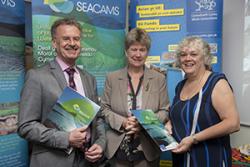£1m EU boost for Marine Centre Wales
 SEACAMS Director, Prof Colin Jago, Finance Minister Jane Hutt and SEACAMS Project Manager, Dr Gay Mitchelson-Jacob at a recent SEACAMS event in Cardiff.Bangor University Vice-Chancellor John G Hughes has welcomed the news that the £23.6m SEACAMS project, which it leads, has been given a £1m EU boost.
SEACAMS Director, Prof Colin Jago, Finance Minister Jane Hutt and SEACAMS Project Manager, Dr Gay Mitchelson-Jacob at a recent SEACAMS event in Cardiff.Bangor University Vice-Chancellor John G Hughes has welcomed the news that the £23.6m SEACAMS project, which it leads, has been given a £1m EU boost.
SEACAMS is an EU scheme pioneering collaborative research projects in marine science between business and universities delivered by Bangor University in partnership with Aberystwyth and Swansea Universities. The project is helping to develop the coastal marine economy in Wales and has already worked with more than 60 companies on R&D projects ranging from developing new products to studying marine life to determining management strategies for rising sea levels.
Vice-Chancellor, Professor John G Hughes said:
“The SEACAMS project is an excellent model illustrating the way that universities can have real impact. This project is contributing to the economic success of Wales in a sustainable manner and reflects the way that academic expertise can work hand in hand with business and industry to make the best use of new technologies and resolve the challenges facing us.
“This further funding will extend the good work that has already taken place under the SEACAMS banner,” he added.
The additional funding will enable the project to expand its work to map and collect data in the Anglesey Demonstration Zone which has been established by the Crown Estate to explore opportunities for offshore renewables in Wales to mitigate the effects of climate change.
The data collected, including model simulations of marine systems produced from such data, will be made available to businesses to develop services and technologies, such as tidal devices, which could be deployed in the area.
It is expected that the resource will increase the likelihood of companies choosing Wales as their preferred site for ongoing and future developments in the offshore renewables sector.
Speaking at a SEACAMS showcase event in Cardiff Bay, Finance Minister Jane Hutt said: “We are committed to combating the effects of climate change through maximising opportunities for sustainable growth, which is why I am pleased that EU funds are helping to provide a tailored programme that will enable businesses to maximise the opportunities presented by this emerging marine renewable energy market.”
“This EU support, through the Structural Funds in Wales, will help to enhance collaborative capacity and will act as a springboard for Welsh Universities and companies to benefit from other EU funding streams including Horizon 2020 – a research and innovation fund worth €79 billion across EU regions which will help create more sustainable growth and jobs across Wales.”
Minesto, a European tidal energy company planning to establish a base in Wales later this year, is one of the companies already benefiting. SEACAMS’ modelling expertise is helping explore the best place to locate their innovative device, called Deep Green, which can reach a speed 10 times higher than the water current to generate electricity.
Charlotta Ekman, Minesto’s Chief Financial Officer said: “SEACAMS computer modelling will show us optimum potential sites, based on the unique operating parameters for Deep Green, and will be able to recommend the best three for further investigation.”
Dr. Gay Mitchelson-Jacob, SEACAMS Project Manager said: “The funding allows us to deploy a range of advanced techniques from our research vessel, RV Prince Madog, providing comprehensive data over the entire 38 square kilometres. SEACAMS, predominantly based in the new innovation centre, the Marine Centre Wales, in Menai Bridge, will process and use the data collected to generate predictive models. Companies deploying tidal and wave devices will be able to use the models to identify sites in the demonstration zone that best suit their specific technologies. Importantly, the models will show seasonal changes in the zone, so companies can understand more about the conditions in which their devices will operate over long periods of time.”
SEACAMS is planning to hold a workshop with companies to engage with offshore survey companies interested in developing collaborative projects in relation to the demonstration zone work.
The SEACAMS project is part funded through the EU’s Convergence European Regional Development Fund through the Welsh Government.
For more information please visit www.seacams.ac.uk or contact info@seacams.ac.uk
Publication date: 26 June 2014
